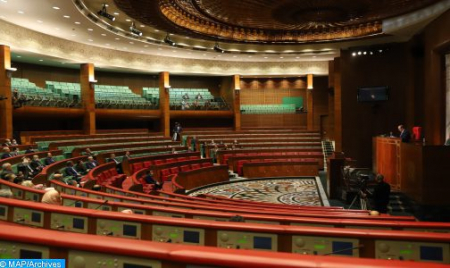Morocco, Indonesia Discuss Strengthening Parliamentary Cooperation
Strengthening parliamentary cooperation between the Moroccan and Indonesian legislative institutions was the focus of talks held Monday by the Chairman of the Committee on Finance, Planning and Economic Development in the House of Advisors (upper house), Moulay Messaoud Agnaou, with a delegation from Committee 7 of the Regional House of Representatives of the Republic of Indonesia. Speaking on this occasion, Agnaou said that “the Moroccan Parliament is ready to work to raise the cooperation relations between the legislative institutions of the two countries to the height of the aspirations of our peoples and the challenges we all face on all levels.” He stressed that efforts are underway to complete the procedures for the establishment of the Moroccan-Indonesian Friendship Group, noting that the two countries have an important economic and trade relationship. Agnaou recalled the establishment in April 2021 of the Moroccan-Indonesian Council for Trade Cooperation and Investment, in addition to bilateral cooperation in the field of export of raw phosphate and phosphorous acid and energy cooperation, economic, cultural and academic between the two countries. He also noted that Morocco and Indonesia maintain cooperative relations in various areas, referring to the visit of the Vice Chairman of the Committee on International Parliamentary Cooperation to the Indonesian People’s Representative Council in February 2018 in Morocco, the participation of the Vice Chairman of the Committee on International Cooperation in the parliamentary meeting on migration in December of the same year in Rabat, as well as the visit of a delegation of the Indonesian People’s Consultative Council in Morocco in December 2018. On the other hand, the chairman of the Committee on Finance, Planning and Economic Development made, during this meeting, a presentation on the experience of micro-credit in Morocco, stressing the richness of the Moroccan experience in this area, which is a model in the Arab region, for income-generating activities for the benefit of thousands of people, as well as the support and monitoring of their small projects. Micro-credits are a pillar of the Moroccan financial system and a key factor in the promotion of financial inclusion and insertion of people with limited income, through the creation of employment opportunities and income-generating activities, he noted, adding that the main mission of microfinance institutions is to promote societal development, given the important role they play in the fight against poverty and marginalization. According to Agnaou, the strategy also aims to contribute to social and economic development, by financing income-generating projects to improve the social situation of beneficiaries and create new jobs, especially in the most vulnerable areas. He recalled in this context the adoption in 1999 of Law No. 18.97 on micro-credit, to support this vital sector and structure it in an organized framework operating on the basis of rules of good governance. Agnaou also emphasized the objectives of micro-credit institutions, the most important of which are the integration and assistance to people to develop their productive activities, the fight against social exclusion, poverty and vulnerability, the diversification of development income and the promotion of small businesses and professions.

